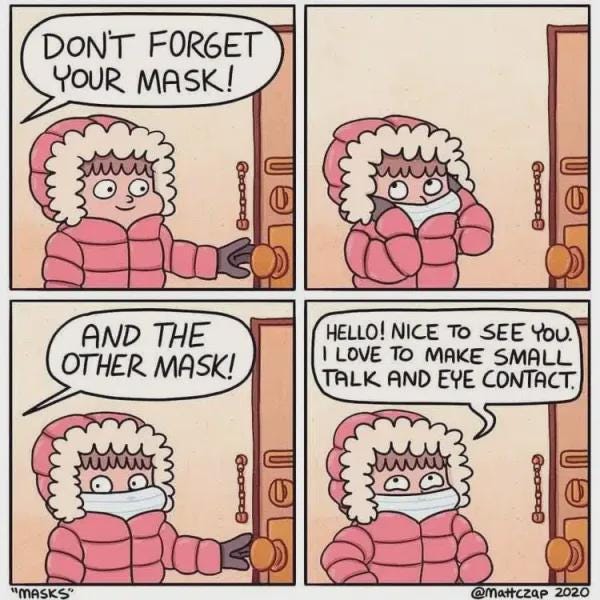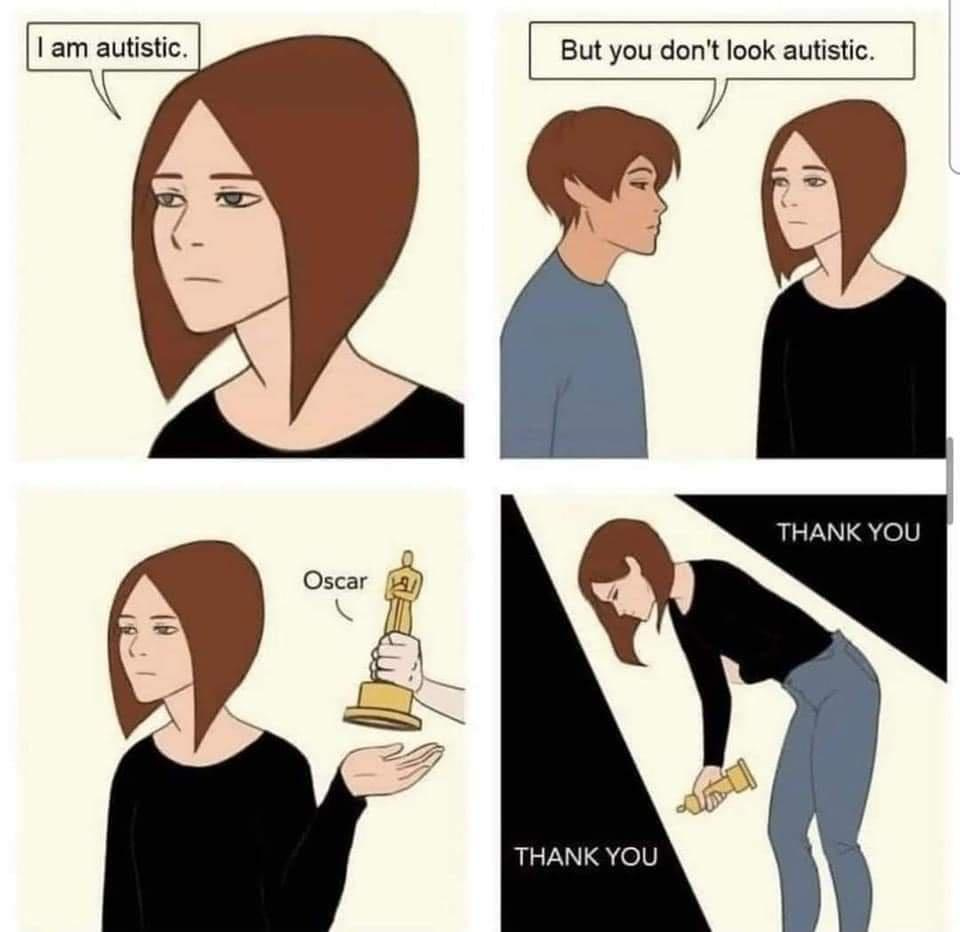I don't understand
But it looks like I do, doesn't it?
Language is the way we communicate. Verbally, but also through body language and the display and recognition of emotions. Social cues are also a like a language, in that there are commonalities but they can vary depending on where you are.
At least verbal languages have rules. They have definitions and grammar and structure and translations to other languages. And when you come across someone with an accent, you don’t judge it, because you’re empathetic to the fact that it’s not their first language. You may even be impressed with them for trying, or grateful that they’ve put in the effort at all.
For most people who speak more than one language, we can become fluent, but it’ll never be our native tongue. We can even hide our accent or come close to not having one— but chances are, when you’re tired or stressed or thinking hard, you revert back to your first language or your accent becomes more noticeable.
I’m a level one autistic woman. I made it until almost 30 years old before I got that diagnosis. I’m smart, my features are feminine and soft, I’m eloquent and empathetic, and I taught myself the rules after many, many failed attempts, so I blend right in.
Being autistic in a non-autistic world is like speaking a language without a dictionary, without the rules, and without a hope of complete fluency.
When I was younger, I didn’t realize I was speaking another language. I could understand others, or so I thought— I missed lots of nuance that comes with fluency. And no one else understood me— that piece I did figure out pretty early on.
And once I understood both of those things, at the ripe age of 11, I worked extremely hard to learn the language of neurotypicality. I immersed myself in the language, in the culture, in the nuance, in the unspoken codes. I did it without a translator, without a guide, without a rule book. It was just expected that I should either know or figure it out.
As anyone who is multilingual will know, it takes a lot of extra mental effort to speak in a different language. It’s mentally challenging and exhausting, and there’s a concern about if you’re getting your point across the way it is in your mind.
It takes a lot of extra mental effort for me to communicate in a “normal” way, or a way that doesn’t put other people off. It’s mentally challenging and exhausting, and there’s a concern about whether I'm getting my point across the way it is in my mind.
No matter how fluent I am now, much like being bilingual— any time I am tired, stressed, emotional, or thinking hard, focused… I revert back to my native “language”. The problem is, no one else knows that their language isn’t automatic to me the way it is to them. They don’t recognize it as a temporary slip in my ability to communicate with them and a place to try to work together to close the gap, they only see it as weird at best, unbearable and shameful at worst.
Something I’ve noticed with people who speak multiple languages is it’s tough when they forget a word in their second, third, etc. language. But when there are so many options in your brain, it’s even more devastating to forget something in your first language. I had someone describe it to me as feeling as if “a part of my past or identity is gone.”
I have put every effort imaginable into never, ever, resorting to my “first language” or natural state. In that effort, I’ve had to actively push away any natural way of being or communicating to me, and I’ve lost myself in the process. It is devastating to be 30 and realize you’ve forgotten everything natural to you and who you are, but also cannot bring it all back without losing all the progress you’ve made within society.
To take it a step further, I’ve learned how to hide in plain sight. I wear the latest trends, but in muted colours. I work hard to stay fit, I wear makeup every day, I smile when I don’t feel like it, and I stay in my lane at school and work (or at least, I try to… that part is what gets me in trouble the most). If someone looks at me, I immediately smile and make eye contact but not too much so that I don’t draw too much attention to myself.
Now, I find myself in a limbo. Knowing that it’s harmful to my health to push away every natural feeling, thought, need in order to have people understand and accept me. But also not being able to stop doing that, because I’m so good at it that when I do slip up, I confuse people, sometimes to the point of anger.
“Why are you talking like that? You’re over sharing. You’re lazy. You’re selfish. You’re rude. You didn’t used to be like this. You can’t read the room.”
If I had a stronger “accent”, or couldn’t speak the “language” at all, that would be a whole other set of intensely difficult problems, but with the same root cause.
I’m grateful that I can translate for myself. I’m grateful that I can fit in. But don’t get that wrong: I’m grateful I can, but it doesn’t undermine how difficult it is and how much energy it takes. And while I would never undermine the experience of others who cannot hide the way I can, and can acknowledge my luck there, at least sometimes there would be more empathy when I mess up.
When I tell people I’m autistic, they either think I’m lying or that it can’t be that hard on me. That it doesn’t even matter because of my societal status— I have a house, a husband, a good job, friends, a relationship with my family, just all around stability. They have trouble believing that I’m not the same as them, because of how fluent I am in their language, or think that I’m undermining other people who present differently than me and have more difficulty than me.
They don’t believe the amount of effort it takes to be me— at least the version of me that they know or that they think they know. And of course other people have it worse. That’s no reason to dismiss my experiences.
All I want is to be able to speak my own language. To be myself and be accepted. My greatest wish my whole life has been to be understood. I can’t express enough how desperately I want to be understood, to the point where I sabotage myself without even realizing until it’s too late by trying so hard that it’s like I double down on the autistic traits, except that they don’t know I’m autistic so they just think I’m rude/selfish/obnoxious/etc.
It has been so helpful to see more people like me become visible and speak about their experience. It makes me feel less isolated, more understood. But the hard truth is that we’ve all been hiding in plain sight for so long that it can still be hard to trust and understand each other.
This isn’t to make anyone feel guilty in any way. Like I said— all I want is to be understood. I’ve taken a deep interest and have an unnecessary understanding of morphology. That hasn’t worked, so I also spent my 20s constantly researching mental illnesses, self help techniques, social trends, communication theory, spirituality. All in the pursuit of either changing myself or trying to be clear enough that those around me are able to accept the fact that I’m not quite as I seem, and that I require a translator sometimes.
I’ve also been misdiagnosed and medicated for conditions I don’t have because no one thought I could possibly be different— I must be sick instead. The pursuit of trying to be better, get better, is one that has always failed, leaving me to feel more broken than ever before.
When I finally got the confirmation that I quite literally am not wired the same way as most people, it was like coming home. It was like being given a mirror and someone saying hey, you’re not bad. You’re not wrong, you’re not selfish or rude. This is you, and it’s ok— you’re not from here. You have your own language and culture and codes, and there ARE other people who will and do understand you. You’re not a bad person.
The psychiatrist I worked with during my diagnostic process told me that while my autism is extremely subtle on the outside, that it’s not subtle at all on the inside and now that they've had a few sessions with me, they can see how much I’ve put into it being unnoticeable to others.
The irony of it all is that I used to volunteer with and tutor teens on the spectrum when I was younger. You may (not) be shocked to know that I loved it because I understood them, even those who didn’t speak at all. What I didn’t understand was why other people had such a hard time getting through to them— they were very clear to me.
Turns out, it’s because I was born with a brain that communicates differently to others but was similar to theirs and I didn’t quite recognize it (no one did) because I presented so differently from them. It is a small thing that brings me comfort because it helps me remember that no matter how tired I am, how hidden within society I am, no matter how much effort I put in, I think I kind of knew then and I definitely know now: I am not fluent in being neurotypical, and understanding that at least gives me self-compassion in the way I have always felt compassion to people who are autistic, even if others give me a hard time and I may never be understood by anyone other than my closest circle.
One day, I’ll write about how this is all bullshit anyways because society has simply made up the rules that exclude us purposely. For now, it’s enough for me to take a deep breath and admit to myself I’ll always be foreign to most people. But at least now, I’m not foreign to myself.
Love you,
Jasmine
PS this obviously isn’t about a book I’ve read or reading at all. but my brain hasn’t wanted to write about books so I’m just writing what I feel for a while.



